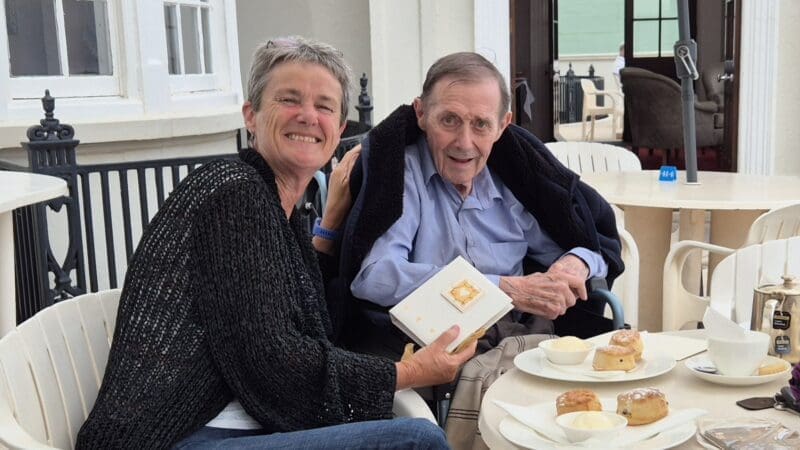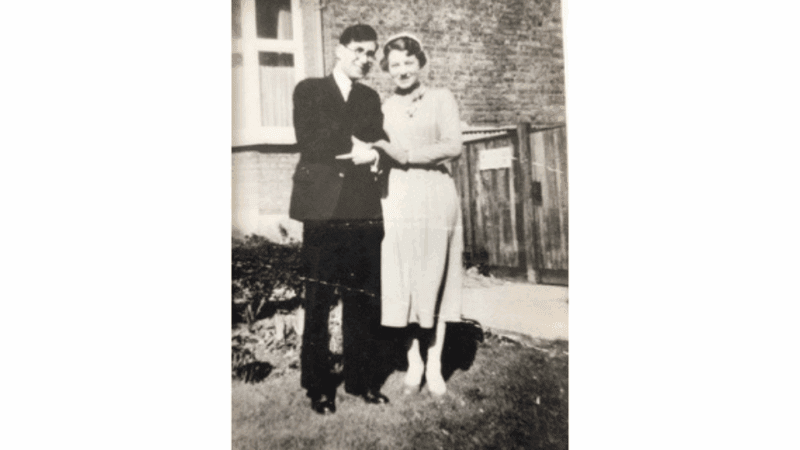
Sarah’s story – “Dementia UK was our saving grace”
Sarah reflects on reaching crisis point when her husband, David, was diagnosed with young onset dementia and the support her family have since received from Dementia UK.
Caring for a person with dementia can be challenging and many people will feel a range of emotions as a carer. One of the most common feelings is of guilt. On this page, our dementia specialist Admiral Nurses explore why carers might feel guilty, how to manage these feelings and how to get support.
When you are a carer, it’s normal to experience a range of emotions, guilt being one of them. Whether you feel that you’re not the best person to do the job or are struggling to cope, it’s important to remember that you are human and your feelings are valid.
There are a number of reasons that someone may feel guilty as a carer and each of them deserves talking about and understanding so that you can get support and relieve feelings of guilt.
All of us can face burnout if we are physically, emotionally and mentally exhausted. When you are caring for someone with dementia, it is understandable if you become overwhelmed at times. It’s important to recognise how you’re feeling and talk to someone about it to start to tackle burnout.
When you are caring for someone with dementia, it is easy to feel that you could be doing more, especially if you have a close relationship with that person. Remind yourself that it is not possible to care for someone on your own 24 hours a day – and that you are doing your best.
It may feel like other areas of your life are being neglected because of your caring duties, such as time with other family members, your friendships, social life or work. We are often our own harshest critics, and talking openly about the situation with the people you feel you’re neglecting may help you feel better understood.
There are many reasons a relationship may struggle when someone takes on a caring role. In romantic relationships, it can be challenging to spend quality, one-to-one time with your partner around your caring responsibilities, while children and young people may struggle to understand the challenges of being a caregiver and why you have less time and energy to devote all your energy to them, leading to feelings of guilt. Try to be as open with them as possible to help them understand.
Your relationship with the person you are caring for may have also become more difficult, particularly if they cared for you at one point in your life – for example, if you care for a parent.
It is normal if you sometimes miss your life before you were a carer and the freedom that came with it. This is common and something that many people feel at times; it doesn’t mean you don’t want to care for the person you are supporting.
The symptoms of dementia can be challenging and complex, and it’s understandable if you sometimes become frustrated with the person, particularly if you don’t know how to help them or they are resisting your support. It’s important that if you feel frustrated, you give yourself a few minutes to take a deep breath and feel calmer – this might involve going into another room, if it’s safe to leave the person briefly.
If the person you are caring for is displaying more challenging behaviour or struggling more than they did before, it’s important to talk to their GP about any changes so you can find out about whether any treatments or support may be available.
While you might feel guilty for wanting to take a break from your caring role, having some time away may allow you to rest and recharge and feel more able to cope with your responsibilities. Respite care or professional home carer could provide the break you need.
If you are taking on the majority of caring responsibilities and you feel other family members are not pulling their weight, it can feel unfair and lead to feelings of resentment or overwhelm. If this is the case, try talking to others who may be able to help with tasks and calmly explain how you’re feeling, as well as what you need help with.
It is natural to feel guilty about moving someone into a care home, especially if you have been caring for them up until that point, but it is important to remember that:
As previously mentioned, feelings of guilt are understandable and perfectly normal. These emotions can be difficult to acknowledge and accept, but there are ways to manage guilt and take care of yourself and the person you are caring for.
Acknowledging your feelings and where they come from is an important step in managing them and making a plan of action to help you feel better. Ask yourself why you feel guilty and when the feelings started to pinpoint what has caused you to feel this way.
Opening up to those who love you can bring feelings of relief and comfort. It is also worth nothing that unless you are honest, they may not know how you are feeling or how to help you, whether that be by sharing caring duties or providing emotional and practical support.
It’s important to remember that you are human and can’t do everything yourself. Having clear boundaries and setting expectations means that you can get support and look after your own mental health. If you are splitting caring responsibilities with another person, discuss who is responsible for what and make sure to keep communication open and honest.
It can be easy to overlook your own needs if you are caring for someone else, but it’s important to ensure you are healthy to be able to give them the best support.
It’s recommended that adults get 150 minutes of exercise per week to stay physically and mentally healthy. Physical activity like walking, exercise classes, going to the gym or out for a run can also give you a break from caring duties. If you request a carer’s assessment, you might be eligible for some assistance to help you access exercise to support your mental and physical health.
We all need healthy, balanced meals to give us fuel. While it’s understandable you may not have much time to cook – or even eat regularly – there are ways that you can eat healthily without too much preparation. Batch-cooking healthy meals that can be put in the freezer and warmed up later is a great way to make sure you eat well if you don’t have time to cook every day. You can also prepare healthy snacks to keep in the fridge or carry around with you, such as fruit or vegetables like carrot sticks.
Sometimes talking to someone outside your family and friends can be helpful, particularly to process any difficult emotions or situations you are facing as a carer. Your GP can direct you to therapy services in your local area.
When you think about what you’re doing for the person you’re caring for, focus on the positive impact that you’ve had on them and their life. If you’re having a tough time, consider what you would say to someone close to you who is experiencing the same feelings while caring for someone else.
Read Susan's story“There is no manual when it comes to caring for a loved one with dementia.”
The people around you may not fully understand the extent of your caring duties or how they affect you, so be open about how much you’re doing and how they can help. Whether it’s catching up on the phone with a loved one, asking someone to sit with the person with dementia for a few hours to give you a break, or getting a friend to pick up your children from school, you may be surprised at how much your other family members and friends want to help.
If circumstances change, and you need to use paid carers or respite services or move the person you care for into a home, try not to see this as a personal failure or as letting the person down.
Remember, you did not ask for this job and have not been trained for it, and seeking professional support could relieve you of some of your caring responsibilities so you can focus on enjoying your time with the person with dementia.
As a carer, you have the right to support too. The Carer’s Assessment will look at ways that your life could be made easier, which can include training in providing care, advice on benefits, having someone else come to in to look after the person with dementia so you can have a break, gym memberships for your wellbeing and more.
You need to contact your local council to arrange the assessment, and it is free. You must be over the age of 18 to request one.
Both Carers Trust and Carers UK are excellent organisations that can support you through your journey as a carer, including signposting to support groups so that you can talk to people who understand exactly what you are going through.
Respite care is short-term care for the person with dementia that allows their carer to take a break. This care could be provided by a paid professional, a volunteer or a short stay in a care home.
Respite care can help the carer by giving them a break and allowing them time to rest and do things that they enjoy without worrying about their caring duties. Longer respite care breaks, where a person may stay in a care home, could be used if the carer is going away on holiday.
If you need advice on any aspect of dementia, please call the Dementia Helpline on 0800 888 6678 (Monday-Friday 9am-9pm, Saturday and Sunday 9am-5pm, every day except 25th December) or email helpline@dementiauk.org. You can also book a phone or video appointment with an Admiral Nurse.

Sarah reflects on reaching crisis point when her husband, David, was diagnosed with young onset dementia and the support her family have since received from Dementia UK.

Jo reflects on the support she has received from her Admiral Nurse, Liz, since her husband was diagnosed with dementia.

Kerry reflects on her mum's dementia journey and her experience doing two of Dementia UK’s virtual event challenges.